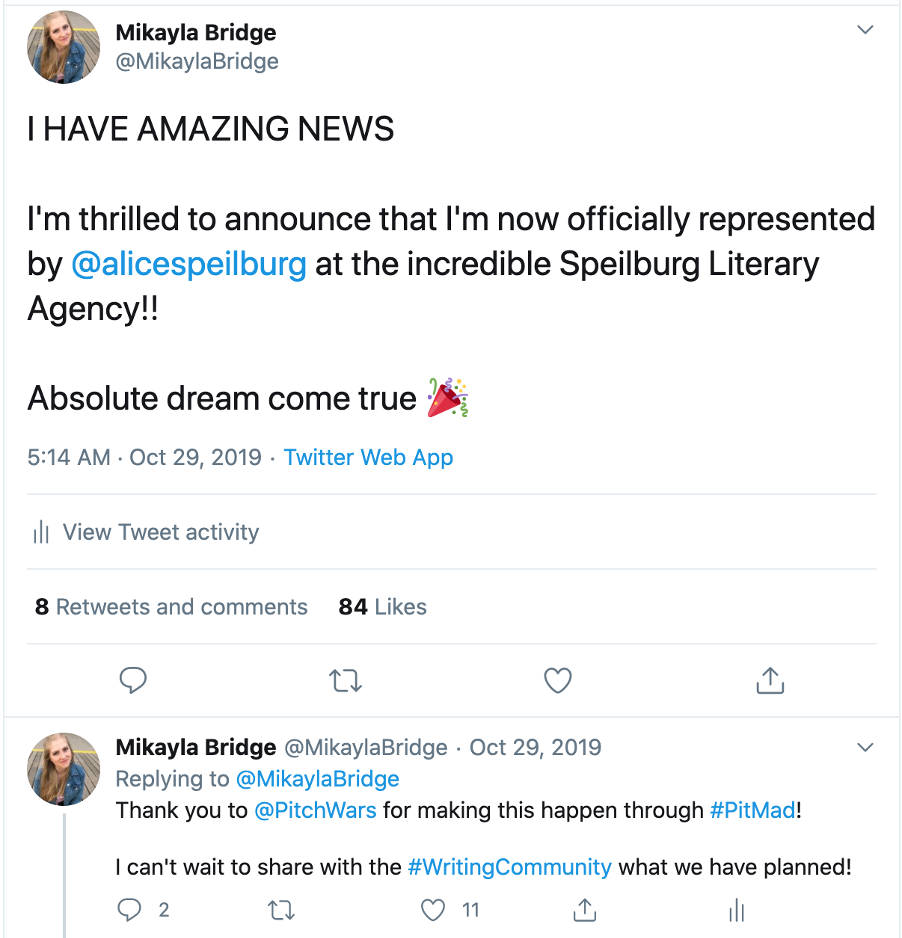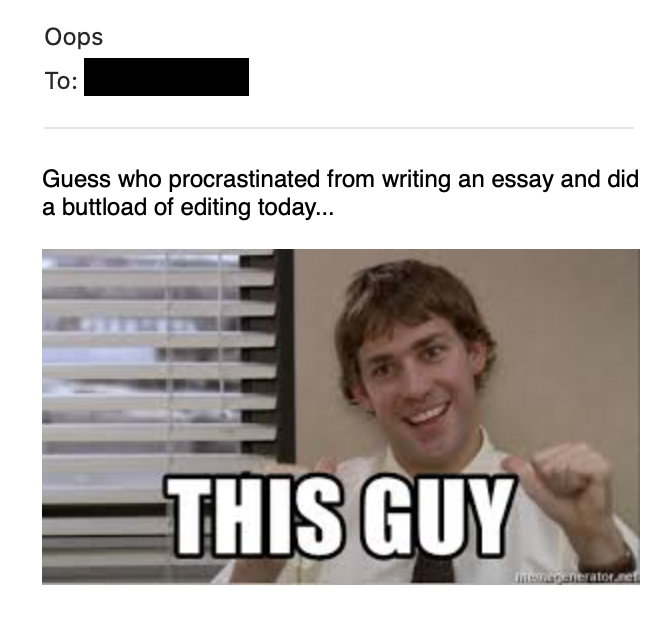|
It’s time for that post! I’ve dreamt of writing these words for years, and now that the time has come, I’m struggling to find the right words (hence the 8-month-late post). I’ve been writing stories since I could hold a pen. I vividly remember the first story I wrote in my first years of school: a young koala’s friends threw her a surprise birthday party! Animal hijinks ensued. Eventually, my stories progressed from drawings to scribbles to words on a computer screen. Ideas kept churning away, and I couldn’t type fast enough to keep up with them. During High School, I wrote my first three manuscripts. Each was a fantasy, written very hastily, with very confusing logic. But with these manuscripts under my belt, the creative juices had turned into a wave that launched open floodgates. University introduced me to a whole new wealth of experiences that I couldn’t wait to integrate into my writing. I chose to study Politics and International Relations. I fell in love with my degree from the moment I stepped into the first lecture hall. It taught me the power of ideologies and the grey histories of many politicians. My degree armed me with a deeper understanding of concepts that I hadn’t realised I’d already been weaving into my stories. If there was a premise in my coursework I couldn’t understand, I knitted it into a story. The characters I wrote helped me understand my own views on political and social issues. Even now, I couldn’t imagine life without fiction writing and politics laced together. During my time at university, I wrote manuscripts #4 and #5. They followed me through my degree, through my exchange semester, through internships and jobs and moving houses and finding new friends. The writing bug refused to give me a moment’s peace. Soon, I began to wonder how writers became published. Though I’d always loved writing as a hobby, it was at this point – entering my third year of university – that I started wondering if the possibility of being published was actually feasible. It was a lifelong dream to see my books on a store shelf, to share characters with others, but I felt like a child dreaming of becoming a Jedi of Skywalker proportions. Eventually, I began researching author success stories and ‘How I Got My Agent’ blog posts. It was still a dream, but with every new scrap of information I found, my dream seemed a little more tangible. Armed with folders and folders of research, I set out to write MS #6. When it came time to start drafting, I didn’t dive straight in. I took more time to plan, instead of letting myself run rampant with every idea that popped into my head (which definitely works for some writers, but not me!). For the better part of a year, I searched. I read far and wide, hunting for the voices that would intrigue me enough to draft a book – and then edit (something I’d never attempted before). Finally, a new voice appeared in my head. It took a long time to form, and lots of research, but eventually, after NaNoWriMo 2018, I had a full draft of MS #6. Over the next few months, I poured every free moment into edits. I added scenes and dialogue, and cut out around 12k. I found it far more arduous than drafting, but also more rewarding. Though it was difficult to prioritise writing alongside work and university, eventually, MS #6 was at a point where I felt comfortable sending it off my only (at the time) critique partner: my sister. Her feedback was as harsh – and accurate – as I’d dreaded. But after another month of revisions, I felt that my manuscript had improved tenfold. Not long after my sister read MS #6, I attended an author panel in June, 2019. I sat alongside many other aspiring writers, listening and soaking up every piece of advice they could offer. Then the topic of querying came up. Prior to this panel, I’d been under the impression that Australian writers could only query Australian agents, or directly query publishing houses that accepted unsolicited manuscripts. But one of the authors relayed her story of signing with an agent in the U.S. She explained her journey to publication through Pitch Wars, an amazing mentoring program where authors, editors and various industry professionals each choose a writer and help them develop their manuscript. The panel’s other authors pitched in, and offered their advice on how best to go about querying agents. Their words were both invaluable and the kick in the backside I needed to jumpstart my search for representation. In my 2019 semester break (when I definitely should have been working on my graduate thesis), I began to accumulate a list of dream agents. Writing as not just a hobby, but a career, suddenly seemed like a possibility, not just a dream. I created a list of agents that had an interest in the genres I wrote. Of these agents, roughly three quarters were open to queries. One of the agents that I had to remove from my list was Alice Speilburg of Speilburg Literary Agency (!!!). She wasn’t currently open to queries, though I thought her manuscript wish list was perfect for MS #6. In July, after receiving further feedback from beta readers, I began querying my first round of agents. The first round consisted of absolute dream agents, and my first-round query letter was Not. Good. I was too excited and too quick to send it out into the world. Though I’d chosen each agent so carefully, I hadn’t put in enough effort to personalise each letter. Even before the first round of rejections rolled in, I knew I needed to alter my query. Between my first and second query rounds, I spent weeks refining my letter. I personalised each, worked on the pitch for my manuscript, and shortened the letter by almost 100 words. With few writing credentials to my name, it was hard not to grow disheartened, but I had MS #7 to keep me distracted. I can’t emphasise this enough: find a hobby, a new writing project, anything to distract you from refreshing your emails every five minutes. With a new query letter sent out, I began seeing different results. I received rejections with personalised feedback, and then partial and full requests. There were still plenty of rejections, but also enough nibbles of interest to give me hope. With MS #7 to distract me, I eagerly awaited the feedback from my partials/fulls, regardless of whether they resulted in an offer of representation. After three months of querying, I began preparing a submission for the 2019 Pitch Wars. I still had a few full manuscripts out with agents, but I’d decided to enter Pitch Wars, rather than send out new queries. So, late September, I laboured over my query letter again, read through my manuscript’s first ten pages another dozen times (at this point, I’d memorised the first chapter), and chose four wonderful mentors to soon submit my application to. A few weeks before the Pitch Wars submission window opened, I participated in #PitMad, an online twitter pitch party where writers tweet a pitch for their manuscript, and agents and editors can make requests by favouriting the tweet. It seemed like a fun event where I could engage with other writers, and get a look at what exactly successful pitches looked like. I set alarms and shared my three tweets throughout the night (thanks to the time difference in Australia!), and, when I posted my last tweet (around 6am), I received a favourite.
When I saw that Alice Speilburg had favourited my tweet, I couldn’t believe my eyes. I thought I might still be asleep! I spent the next day personalising my query and read through the first three chapters of MS #6 again, before sending it to Alice. Three days later, Alice wrote back to me and requested the full manuscript. After I sent through my full manuscript, I tried to distract myself again with MS #7 (which was near-impossible). In late September, the Pitch Wars submission window opened. I sent in my query letter and chapter samples to my four chosen mentors and, again, waited. It was in this window of waiting that I heard back from Alice. I read through her email until I could recite it word for word. We quickly arranged a time to speak over the phone the next day, to discuss my book further. The call was a total blur of very sweaty hands and cheek-splitting grins. Hearing Alice’s excitement for my story was a thrill like nothing I’d ever felt before. When she made an offer of representation, I could feel in my gut that Alice was the right agent for me. We arranged a time to speak ten days later, while I notified other agents with my manuscript that I’d received an offer (a very strange position to be in!). After the ten days, I let Alice know that I’d love to sign with her. It still feels surreal, finding an agent and through Twitter of all places! My story as posted on the Pitch Wars website:
3 Comments
|
© 2024 Mikayla Bridge. All rights reserved
linktr.ee/mikayla_bridge
linktr.ee/mikayla_bridge



